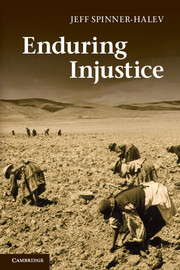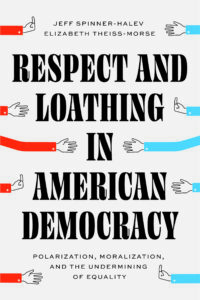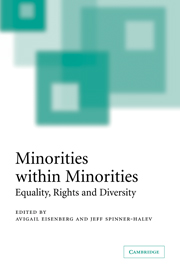Respecting and Loathing in American Democracy: Polarization, Moralization and the Undermining of Equality
with Elizabeth Theiss-Morse (Willa Cather Professor of Political Science at the University of Nebraska, Lincoln)
University of Chicago Press, 2024
Respect is in trouble in the United States. Many Americans believe respecting others is a necessary virtue, yet many struggle to respect opposing partisans. Surprisingly, it is liberal citizens, who hold respect as central to their view of democratic equality, who often have difficulty granting respect to others. Drawing on evidence from national surveys, focus groups, survey experiments, and the views of political theorists, Jeff Spinner-Halev and Elizabeth Theiss-Morse explain why this is and why respect is vital to—and yet so lacking in—contemporary US politics. Respect and Loathing in American Democracy argues that liberals and conservatives are less divided than many believe, but alienate one another because they moralize different issues. Liberals moralize social justice, conservatives champion national solidarity, and this worldview divide keeps them at odds. Respect is both far-reaching and vital, yet it is much harder to grant than many recognize, partly because of the unseen tension between respect, social justice, and national solidarity. Respect and Loathing in American Democracy proposes a path forward that, while challenging, is far from impossible for citizens to traverse.
Enduring Injustice 
Cambridge University Press, 2012
Governments today often apologize for past injustices and scholars increasingly debate the issue, with many calling for apologies and reparations. Others suggest that what matters is victims of injustice today, not injustices in the past. Spinner-Halev argues that the problem facing some peoples is not only the injustice of the past, but that they still suffer from injustice today. They experience what he calls enduring injustices, and it is likely that these will persist without action to address them. The history of these injustices matters, not as a way to assign responsibility or because we need to remember more, but in order to understand the nature of the injustice and to help us think of possible ways to overcome it. Suggesting that enduring injustices fall outside the framework of liberal theory, Spinner-Halev spells out the implications of his arguments for conceptions of liberal justice and progress, reparations, apologies, state legitimacy, and post-nationalism.
Buy the book from Cambridge, Amazon or Barnes and Noble.
Read the reviews:
Notre Dame Philosophical Reviews
Dialogues on Historical Justice and Memory
Minorities Within Minorities (co-edited with Avigail Eisenberg), Cambridge University Press, 2005
Groups around the world are increasingly successful in maintaining or winning autonomy. However, what happens to individuals within the groups who find that their group discriminates against them? This volume brings together sixteen distinguished scholars who examine the balance between group autonomy and individual rights in relation to conflicts involving gender, religion, culture, and indigenous rights in the national and international sphere.
Buy the book from Cambridge or Amazon.
Surviving Diversity: Religion and Democratic Citizenship, Johns University Press, 2000
 While liberal advocates of multiculturalism frequently call for tolerance of those with diverse views, this tolerance is often not extended to members of religious groups. This lack is perhaps not surprising, since the liberal ideals of autonomy, equality, and inclusiveness are the very ones that many religious groups—particularly the more conservative ones—reject. Yet, as Jeff Spinner-Halev argues in Surviving Diversity, any theory of multiculturalism that fails to take religious groups into account is incomplete.
While liberal advocates of multiculturalism frequently call for tolerance of those with diverse views, this tolerance is often not extended to members of religious groups. This lack is perhaps not surprising, since the liberal ideals of autonomy, equality, and inclusiveness are the very ones that many religious groups—particularly the more conservative ones—reject. Yet, as Jeff Spinner-Halev argues in Surviving Diversity, any theory of multiculturalism that fails to take religious groups into account is incomplete.
Spinner-Halev proposes three principles on which accommodation of exclusive religious groups should be based. First, they must provide their children with a basic education and allow adults to leave the community if they wish. Second, with some exceptions they should be welcomed to participate in the public sphere, since such participation often bolsters citizenship. Third, they should be free to exclude others from their institutions, except when doing so substantially harms the citizenship of others. While not condoning such extremist groups as the Branch Davidians or the Christian Identity movement, Spinner-Halev stresses that most religious conservatives have chosen to live a life that, in a permissive Western democracy, requires considerable restraint and thought. He concludes by demonstrating how the ideals of multiculturalism can be extended to such citizens, creating a society tolerant of even greater diversity.
Buy the book from Johns Hopkins or Amazon.
The Boundaries of Citizenship: Race, Ethnicity and Nationality in the Liberal State
John Hopkins University Press, 1992
 Liberalism has traditionally been equated with protecting the rights of the individual. But how does this protection affect the cultural identity of these individuals? In The Boundaries of Citizenship Jeff Spinner addresses this question by examining distinctive racial, ethnic, and national groups whose identities may be transformed in liberal society.
Liberalism has traditionally been equated with protecting the rights of the individual. But how does this protection affect the cultural identity of these individuals? In The Boundaries of Citizenship Jeff Spinner addresses this question by examining distinctive racial, ethnic, and national groups whose identities may be transformed in liberal society.
Focusing on the Amish, Hasidic Jews, and African Americans in the United States and on the Quebecois in Canada, Spinner explores the paradox of how liberal values such as equality and individual autonomy—which members of cultural groups often fight to attain—can lead to the unexpected transformation of the group’s identity. Spinner shows how liberalism fosters this transformation by encouraging the dispersal of the group’s cultural practices throughout society. He examines why groups that reject the liberal values of equality and autonomy are the most successful at retaining their distinctive cultural identity. He finds, however, that these groups also fit—albeit uneasily—in the liberal state.
Spinner concludes that citizens are benefitted more than harmed by liberalism’s tendency to alter cultural boundaries. The Boundaries of Citizenship is a timely look at how cultural identities are formed and transformed—and why the political implications of this process are so important. The book will be of interest to readers in a broad range of academic disciplines, including political science, law, history, sociology, and cultural studies.
Buy from Johns Hopkins or from Amazon.


